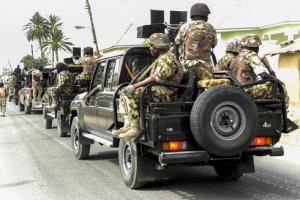African securityBoko Haram embroiled in deadly in-fighting between rival factions vying for control
Nigerian Islamist group Boko Haram, already reeling under the combined military pressure of Nigeria, Niger, Chad, and Cameroon, and facing a growing wave of desertion from its ranks, is now also being hobbled by in-fighting between rival factions. The rift began in early August, when ISIS announced that Abu Musab al-Barnawi was the group’s new leader, replacing Abubakar Shekau, who had led the group since 2009. Shekau defied ISIS and announced he was still the leader – and the two factions have been locked in deadly skirmishes for four weeks now.

Infighting and continued pressure from outside nations buckling Boko Haram // Source: theconversation.com
Nigerian Islamist group Boko Haram, already reeling under the combined military pressure of Nigeria, Niger, Chad, and Cameroon, and facing a growing wave of desertion from its ranks, is now also being hobbled by in-fighting between rival factions.
Newsweek reports that the rift began in early August, when the media arm of ISIS, operating out of Syria, announced that Abu Musab al-Barnawi was the group’s new leader.
ISIS installed al-Barnawi to replace the previous leader, Abubakar Shekau, but Shekau defied ISIS and announced he was still the leader. The AFP news agency reports that within days of the leadership squabble coming into the open, deadly skirmishes between the followers of each of the leaders erupted, and that they are still going on, limiting Boko Haram’s ability to stage attacks against civilians in north-east Nigeria.
Sources within the Nigerian military say that, at least for now, Shekau’s loyalists appear to be losing the fight, with scores of them killed and wounded in fighting across three villages in the Monguno area of Borno state.
Witnesses told AFP that the attacks were launched by the Barnawi faction, thus supporting analysts’ assessment that the pro-Barnawi faction has seized the initiative.
The ISIS leadership in Syria had been increasingly critical of Shekau’s preferred strategy of suicide bombings in crowded areas (see “Boko Haram leader ‘fatally wounded in army air strike’: Nigeria,” HSNW, 23 August 2016) — and witnesses told AFP that the Barnawi fighters told villagers the other faction[Shekau’s] had “derailed from the true jihad” by killing innocent people and looting their property.
In comments he made shortly after he was named the new leader, Barnawi pointedly criticized his predecessor for “targeting the ordinary people.”
When Barnawi talks of “ordinary people” he means Muslim ordinary people. ISIS’s main criticism of Shekau was that most of the victims of his indiscriminate attacks were fellow Muslims. ISIS also criticized Shekau for using young girls in suicide attacks – and it was his refusal to obey ISIS’s orders to stop using children in such attacks that led to his replacement.
In August, Barnawi – believed to be the son of Boko Haram’s founder, Mohammed Yusuf, who died in 2009 – gave an interview to ISIS-linked magazine Al-Naba. He said that his intention was to focus the group’s attacks on Nigeria’s Christian population, speaking of “booby-trapping and blowing up every church we are able to reach, and killing all of those who we find from the citizens of the Cross,” according to a translation of the report by the SITE Intelligence group.
Local villagers told Bloomberg News that the factional in-fighting had prompted many Boko Haram fighters to abandon the group and tur themselves in to the Nigerian authorities. These fighters brought their families with them to the government-run detention centers, fearing for the safety of their family if they stayed in Boko Haram-controlled areas.
“They are under custody of Monguno command, and we believe the dual battle between Barnawi’s and Shekau’s camps may have compelled them to sneak out and surrender,” one villager told Bloomberg News.
The campaign against Boko Haram had become more effective since January 2015, when Niger, Chad, and Cameroon joined the battle over the initial objection of then-president Goodluck Jonathan of Nigeria. The campaign has become even more cohesive and efficient after Muhammadu Buhari replaced Jonathan as president in May 2015.
Heavy rains have slowed the Nigerian military’s advance toward the Sambisa forest, which the Nigerian government describes as Boko Haram’s “final bolthole.” The densely forested area’s dirt roads, especially during the rainy season, make it difficult for tanks, artillery, and armored vehicles to advance, but airstrikes by the U.S.-trained Chad air force continue to inflict losses on the Islamist group.
The Nigerian military says that Boko Haram is running short on supplies and ammunition –but observers say that the shortages are also making life miserable for civilians still living in the area.
Military analysts say that its recent setbacks notwithstanding, Boko Haram still pose a serious threat to the region.
